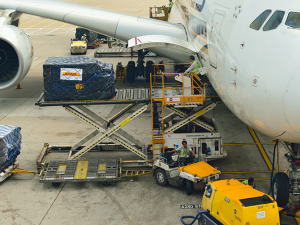The Kempegowda International Airport, Bengaluru (BLR Airport) recorded its highest-ever cargo tonnage in Financial Year (FY) 2022, despite challenging circumstances due to multiple Covid waves. BLR Airport processed an all-time high tonnage for a fiscal year since Airport Opening Day (AOD) of 411,513 Metric Tonnes (MT) of cargo, recording a growth of 26% as against 326,643MT in FY 2021. International cargo recorded a 31.1% growth, 271,988MT processed, as compared to 207,518 MT in FY 2021. Domestic cargo grew at 17%, with 139,525MT versus 119,125MT in FY 2021. Perishable cargo has been one of the major growth drivers for BLR Airport. It is the No.1 airport in the country for handling perishables — estimated to account for 31% of India’s total perishable shipments. BLR Airport processed 39,518 MT of cargo in October 2021 — the highest ever for a month since AOD. International cargo processed (both imports and exports) was also the highest ever in October 2021, accounting for 25,695 MT. The Airport achieved a significant record by gaining 13% of India’s air cargo market share and 45% of South India’s air cargo market share. With this achievement, BLR Airport has become the only major airport in the country to show growth over pre-pandemic levels.
Read More »Everts Air Cargo expands fleet, converts MD-88SF
Everts Air Cargo is expanding its fleet with the conversion of an MD-88SF into a freighter configuration through Aeronautical Engineers, Inc. (AEI). The aircraft will commence conversion in March 2023 with modification touch labor being performed by Dothan, Alabama-based, Commercial Jet, which is an authorised AEI Conversion Center. Everts will use the freighter to accommodate fleet expansion plans. The AEI MD-88SF is capable of carrying 12 88” x 108” Containers/Pallets. Everts Air Cargo is the sister company to Everts Air Alaska and serves customers residing in larger Alaskan cities, as well as, small villages in remote locations. The company’s primary business is transporting freight and mail, as well as the movement of oversized freight, hazardous materials and small packages. The company’s fleet consists of C-46 and DC-6 aircraft, which are well-suited to the many shorter, unimproved gravel or ice runways in Alaska, along with DC-9s, and MD-80s.
Read More »Air cargo sees 8% dip in 2022, goes close to pre-COVID levels
IATA released data for global air freight markets showing that 2022 full-year demand for air cargo took a significant step back from 2021 levels but was close to 2019 performance. Global full-year demand in 2022, measured in cargo tonne-kilometers (CTKs*), was down 8.0% compared with 2021 (-8.2% for international operations). Compared with 2019, it was down 1.6% (both global and international). Capacity in 2022, measured in available cargo tonne-kilometers (ACTKs), was 3.0% above 2021 (+4.5% for international operations). Compared with 2019 (pre-COVID) levels, capacity declined 8.2% (-9.0% for international operations). December saw a softening in performance: global demand was 15.3% below 2021 levels (-15.8% for international operations). Monthly cargo demand tracked below 2021 levels from March 2022. Global capacity was 2.2% below 2021 levels (‑0.5% for international operations). This was the tenth consecutive monthly contraction compared with 2021 performance. 2022 ended with mixed signals: Global new export orders, a leading indicator of cargo demand, have stayed at the same level since October 2022. For major economies, new export orders are shrinking except in Germany, the United States, and Japan, where they grew. Global goods trade decreased 1.5% in November, down from a 3.4% increase in October. The Consumer Price Index for G7 countries indicated inflation tracking at 6.8% for December. The 0.6 percentage point drop compared with November (7.4%) was the largest over the course of year. Inflation in producer (input) prices reduced to 12.7% in October, its lowest level so far in 2022. “In the face of significant political and economic uncertainties, air cargo performance declined compared with the extraordinary levels of 2021. That brought air cargo demand to1.6% below 2019 (pre-pandemic) levels. The continuing measures by key governments …
Read More »Amzon scales back cargo flying as demand cools
The e-commerce giant, Amazon is scaling back on flights this year, citing lower demand and slower economic growth. Air Transport Services Group, which runs a significant portion of Amazon’s air cargo fleet, said it expects to operate Boeing 767 freighters dedicated to servicing Amazon and DHL at reduced schedules and less flight time per aircraft. “Both companies are adjusting their ground and air distribution and fulfillment networks in the United States to conform to reduced U.S. economic growth and consumer spending levels in the first half of 2023,” ATSG said. Air cargo rates, which surged in recent years due to port congestion and high demand for fast deliveries, have slumped. The Baltic Air Freight Index was down more than 33% on Jan. 30 from a year earlier. The International Air Transport Association said last month that air cargo demand in November was down nearly 14% from the year-ago period, while capacity fell 1.9%. Meanwhile, passenger airlines have said travel demand has held up as consumers prioritize trips and other experiences. But coming off Amazon’s weakest year for growth in its quarter century as a public company, CEO Andy Jassy has taken steps to curtail expenses. That includes cutting more than 18,000 jobs, pausing warehouse expansion and shuttering some projects.
Read More »New Goa Airport’s cargo ops go digital with Kale Logistics Solutions
Kale Logistics Solutions (Kale) has gone live with its state-of-the-art cargo management system, GALAXY, at GMR Goa Air Cargo (GGAC), completing implementation of 100 percent digital domestic cargo operations at the new Goa airport. Kale’s web-based solution, GALAXY, is enabling end-to-end digital processing for all domestic outbound cargo at GGAC, from acceptance to loading and departure, as well as for domestic inbound cargo from flight arrival and flight check through to cargo delivery at the warehouse. GMR Goa International Airport Limited (GGIAL), a subsidiary of GMR Airports Limited (GAL), was inaugurated in December 2022 by Prime Minister Shri Narendra Modi, and the domestic air cargo operations went live from an interim facility at the airport with Kale’s solution in January. “GMR Goa Air Cargo has set a new record, going digital from the start button,” said Vineet Malhotra, Co-Founder and Director, Kale Logistics Solutions. “Our longstanding strategic partnership with GMR Cargo and deep understanding of their business, challenges, and market dynamics positions Kale well to help them meet higher customer expectations. “Supported by our fully digital solution, we are confident that GGAC will exceed its cargo handling estimates, and look forward to supporting its commitment to sustainable operations.” The GALAXY cargo management system is used by several hub airports and cargo terminals all over the world and is currently operating at more than 100 air cargo stations globally. The solution also covers processing for transshipment and direct delivery, as well as for inbound and outbound cargo. The newly launched Goa International Airport looks to become a hub for cargo movement alongside Mumbai and Bengaluru in Western India.
Read More »‘New airports & aerodromes will expedite regional connectivity’
Debajyoti Bagchi, VP, Trucking and Air Cargo Charters, TT Aviation Handling Services Pvt Ltd. said, “The ‘Bright Star’ 2023 budget of the world’s 5th largest economy reveals people centric agenda and facilitate sustainable economic development. It’s a progressive thought process of new India that has aimed at artificial intelligence, MSMEs as a growth engine, women empowerment, digitization, and most importantly Indian start ups which is the 3rd largest ecosystem globally. The vision of 50 additional airports & aerodromes will expedite the abundance of regional connectivity including passenger and cargo. In addition to that, the prioritization of 100 identified critical transport projects will be a crucial factor for NLP deliverables. Revision of the income slabs in the proposed income tax regime will allow some definite breather for people. However, the budget doesn’t mull anything on the lowering of the fuel/LPG prices to reduce overall inflation.
Read More »‘Develop capacity for sustainable growth’
B Govindarajan, Founder and COO, Tirwin Management Services said, “The big push to Capex would certainly help the logistics sector to grow. It shoukd be kept in mind, mere brick and mortar as infrastructure is not sufficient. The country can not afford to depend on foreign operators for both air and sea cargo capacities. The focus should be on developing national capacities in order to ensure sustainable growth.”
Read More »‘Emphasis on strengthening tech, infra will boost growth’
Abhijit Verma, Founder & MD, Avinya Logistics & Industrial Parks said, “The 2023 budget of India is a beacon of hope for the working class, who form the backbone of our nation. The focus on job creation, skill development and providing social security to the working class is commendable. The emphasis on strengthening the technology adoption through payments infrastructure and Digilocker will go a long way in making a big impact in the lives of millions of Indians. The allocation of funds for skilling programmes, start-up ecosystem, and tax sops will benefit businesses and individuals alike. The budget strikes a perfect balance between economic growth and social welfare, making it a step towards a more equitable and prosperous India for all.”
Read More »‘Investment in infra will enable seamless movement of goods’
Suresh Kumar R, Chief Executive Officer, Allcargo Logistics says, “The budget is focused on continuity in the direction of macro policies and economic strategy. The seven priorities have a strong positive bias for infrastructure development. Developing national infrastructure and the government’s thrust on capital expenditure of Rs 10 lakh crore indicates that it is pushing forward with its transformative agenda. Furthermore, the first and last mile connectivity has been prioritized by identifying one hundred critical transport infrastructure projects especially for ports, coal, steel, fertilizer, and food grains sectors with investment of 75,000 crore, including 15,000 crore from private sources. To encourage energy efficiency government will promote coastal shipping as low-cost mode of transport for passengers and freight, through PPP mode with viability gap funding. To further ease the movement of the cargo in the country expenditure on the Dedicated Freight Corridor has been raised for the financial year and is 75 percent higher than the Rs 15,710.44 crore allocated for FY23. Additionally, to boost regional connectivity government is looking to revive fifty additional airports, heliports, water aerodromes and advance landing grounds. All of these provisions will help the country to bolster the strength of Indian manufacturing by assisting in seamless movement of goods and accelerate India’s integration into the global supply chain by strengthening its necessary physical infrastructure and helping to boost imports from India by lowering the logistics cost. Focus on Green growth, and tax benefits for lower income slabs aimed at youngsters and senior citizens completes a wholesome budget.”
Read More »‘Indirect tax simplification will deliver high exports’
Vipul Bhalla, Chief Business Officer, Pradhaan Air Express said, “The 2023 union budget reflects a continuation of the Government’s fiscal consolidation strategy. As India’s youngest cargo airline, Pradhaan Air Express is buoyed by the increased effective capital expenditure of 13.7 lakh crores and expected growth of 7% reflecting a bigger positive sentiment as compared to other world economies. Among other things, continuing the tax exemption for start-ups, reduction in Customs duties to spur domestic manufacturing, and allocation of 35000 crores for achieving net zero and Green growth are all welcome steps. Simplification in indirect taxes will also deliver higher exports and value addition in the economy. In related sectors, investments in Aerodromes and tourism, a boost for Electrical vehicles, semiconductors, and Lithium Ion battery manufacturing will all have a positive impact on air cargo capabilities and infrastructure. We believe the budget supports our economic recovery with improvements also expected in international and domestic air cargo volumes as the policies and measures unfold in the coming days.”
Read More » Cargo Breaking News
Cargo Breaking News









